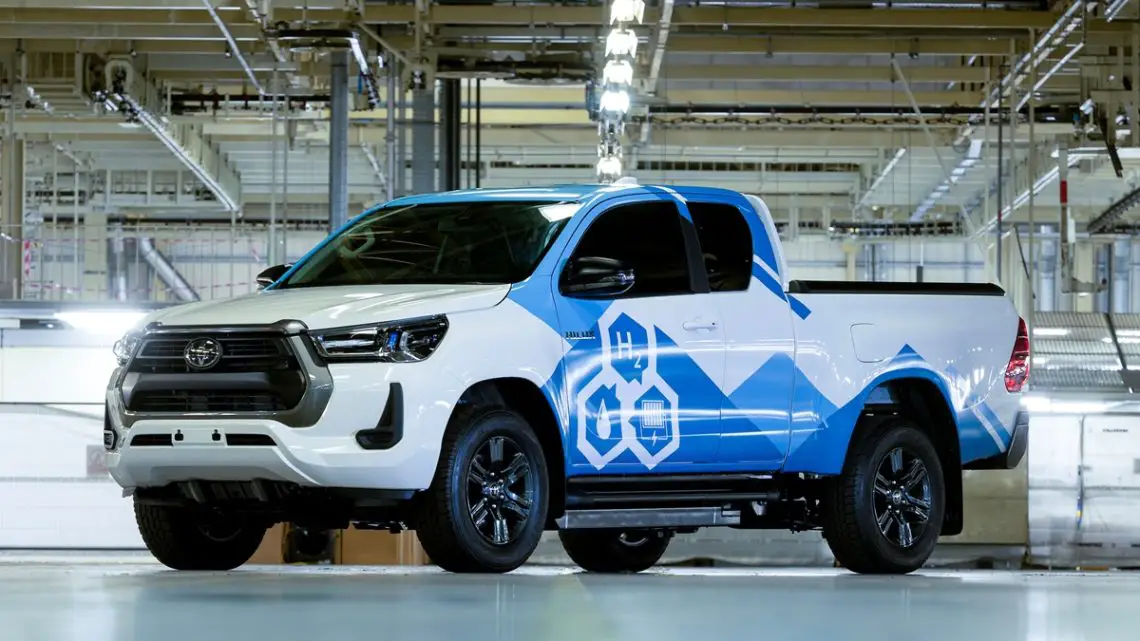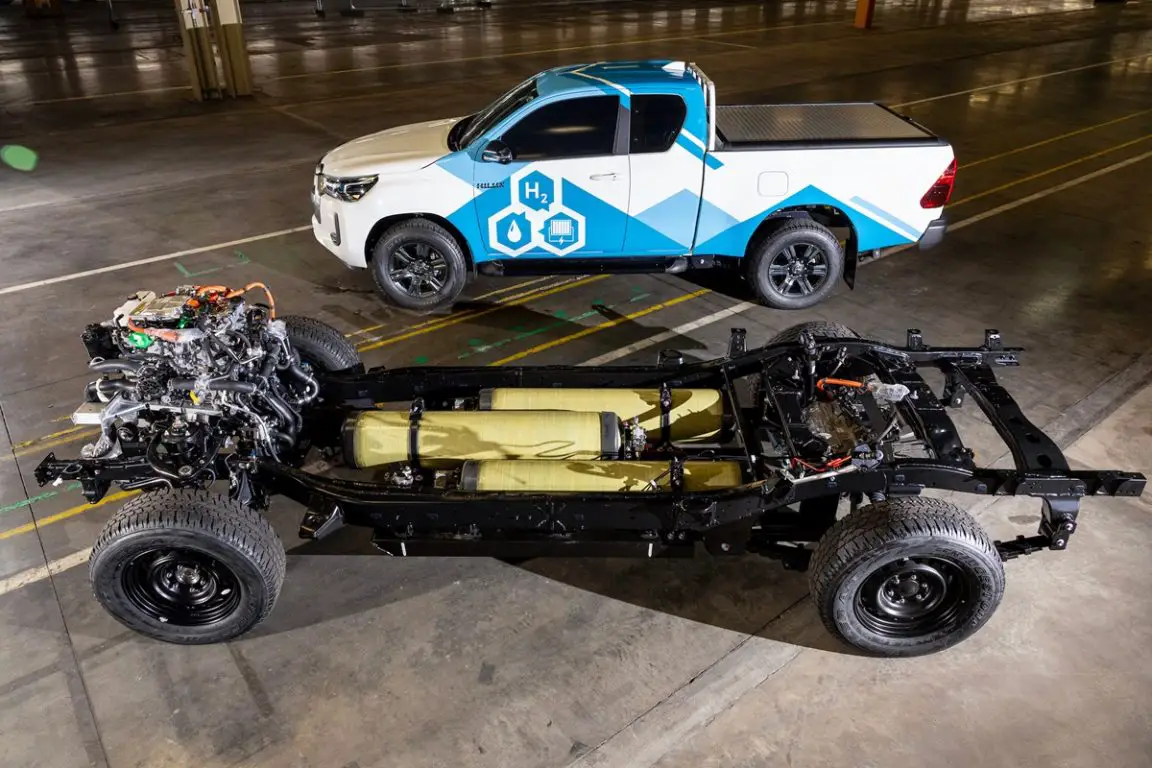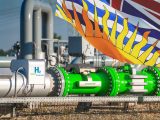
Are hydrogen pickup trucks Toyota’s key to the H2 passenger vehicle market?
May 9, 2024The automaker’s execs see Tundra-sized vehicles as ideal for using fuel cells
Toyota has been making some strong moves in H2 recently, and its execs are now pointing to hydrogen pickup trucks as a notable opportunity for the company’s zero-emission lineup.
H2 provides the power and range these vehicles need
According to Toyota, hydrogen pickup trucks would be able to match the range of a fossil fuel-powered vehicle, only without the greenhouse gas emissions.
While the automaker’s H2-powered passenger vehicles – that is, the Mirai – haven’t caught on very well, the company now sees an opportunity for the technology in larger passenger vehicles, in the form of pickups.
Battery electric vehicles have rapidly taken a vast lead in the personal vehicle market, leaving behind H2-powered alternatives such as the Mirai or the Hyundai Nexo. Whatever the reason for this trend – from execution of charging infrastructure to price – passenger cars powered by H2 simply haven’t taken off. That said, Toyota believes that larger personal vehicles hold a substantial amount of promise.
Toyota is looking to hydrogen pickup trucks
While automakers developed hydrogen fuel cells for the passenger vehicle market, the focus was on sedans and other cars, though not often on larger vehicle. Now, Toyota is seeing the potential trucks and pickups have in personal and commercial markets due to their power and range.

Hydrogen Hilux Image Source: Toyota
Toyota already has substantial interest and resources in this area, so if there is a company that could put H2-powered pickup trucks on roads around the world, it could be the one. The key is to make it commercially viable, something it has failed to do with H2 vehicles until this point.
The Toyota Tundra offers the right size
According to Toyota chief engineer for advanced mobility Jay Sackett, who was previously the Toyota Tundra pickup project engineer, hydrogen fuel cell technology “offers a great opportunity for light-duty trucks. You could get to the same amount range for a truck that you would need a very large battery for.”
During an interview that took place at the automaker’s North American H2 HQ, Sacket discussed the subject of hydrogen pickup trucks. There, group vice president Jordan Choby also talked about H2, discussing the way that the automaker’s existing hydrogen tanks would fit perfectly in a hydrogen pickup truck about the size of the Tundra.
He added that they “have a fuel cell Tundra in Japan that we use to tow our hydrogen internal combustion race car.”
Nothing official yet
 So far, despite the enthusiasm expressed by both Toyota execs, there has yet to be a decision officially made regarding the production of a new H2-powered vehicle, let alone hydrogen pickup trucks. Nothing has been announced to say that there are projects moving forward using those H2 tanks or in a vehicle the size of a Tundra.
So far, despite the enthusiasm expressed by both Toyota execs, there has yet to be a decision officially made regarding the production of a new H2-powered vehicle, let alone hydrogen pickup trucks. Nothing has been announced to say that there are projects moving forward using those H2 tanks or in a vehicle the size of a Tundra.
It isn’t difficult to see why the company sees opportunity in such a project. Fuel cell vehicles of that size tend to make more sense than those powered exclusively by electric batteries, due to issues with range when towing substantial weight. Moreover, the weight of the battery itself is also an impediment to that type of application.
When pressurized hydrogen is on board for powering a fuel cell, the weighty battery in hydrogen pickup trucks would be substantially smaller. This would allow the range to be comparable to those of conventional fossil fuel combustion vehicles.
According to Sacket, a fuel cell pickup truck is just what US consumers and businesses are looking for.
“Tundra owners like to tow. Truck owners also want the fast fueling. Hydrogen allows you to do that. You can pump it like gasoline,” he explained.



 With over 15 years of reporting hydrogen news, we are your premier source for the latest updates and insights in hydrogen and renewable energy.
With over 15 years of reporting hydrogen news, we are your premier source for the latest updates and insights in hydrogen and renewable energy.
The main reason hydrogen hasn’t taken off is the lack of refueling sites. Toyota would do.well to lead the industry and make every Toyota dealership capable of providing hydrogen refueling. That would be a start
Governments that are serious about reducing carbon emissions might see this a start programs to require and assist interstate fuel stations to offer hydrogen. If and when this happens you would see hydrogen take off. The lack of refueling is the only thing stopping me from getting a hydrogen vehicle.
Totally agree, and your suggestion of starting with all Toyota dealerships having refueling stations is perfect! I’d love to trade in my current Tundra for a H2 powered Tundra.
It will be a failure, no hydrogen infrastructure and the price of hydrogen gas is too expensive.
Great write-up! Hopefully this Toyota Tundra H2 light-duty truck goes ahead into production!
They would easily sell millions of them! And the people and the Earth would be happy! “Oh, what a feeling!”
Your dreaming, right?
Always!
Dreaming is believing. 🙂
Like with BEV’s, hydrogen vehicles suffer from lack of refill/charging infrastructure. Toyota could move things along by installing hydrogen refilling facilities at their dealerships. If my local Toyota dealership had hydrogen refill capabilities, I would definitely buy a Mirai tomorrow.
At $36 a kilogram for hydrogen (approximately .80 cents a mile to drive), too expensive, and no infrastructure to support it!
Good Luck
Isn’t the cost of hydrogen actually $13 to $16 per kilogram at refuelling stations in California for example? Thus making it more around $.36 per mile to drive?
Currently, gasoline in California (who pay the highest in gasoline prices in the country) is around $5.40 per gallon. Factor in the mileage of an average gasoline car or truck (that say gets around 25 miles to the gallon) the retail price per mile is around $.216 (about 40% less than hydrogen is currently).
What do you think will happen to the price per mile of hydrogen if they increase production and increase the infrastructure (distribution and refuelling)?
Dare to dream?
Hydrogen refilling facilities and sustainable green H2 are the key factors to support H2-powered mobility.